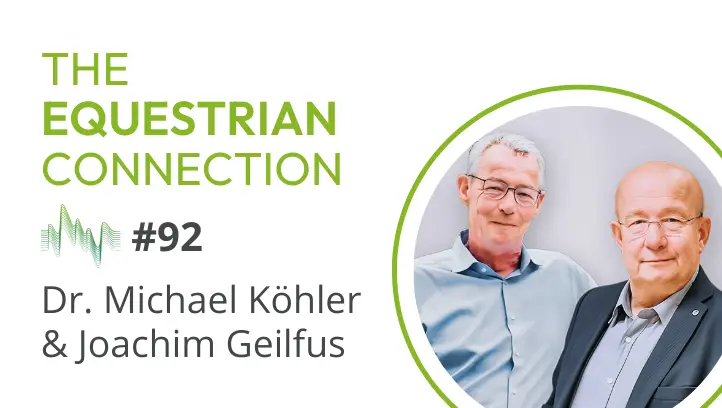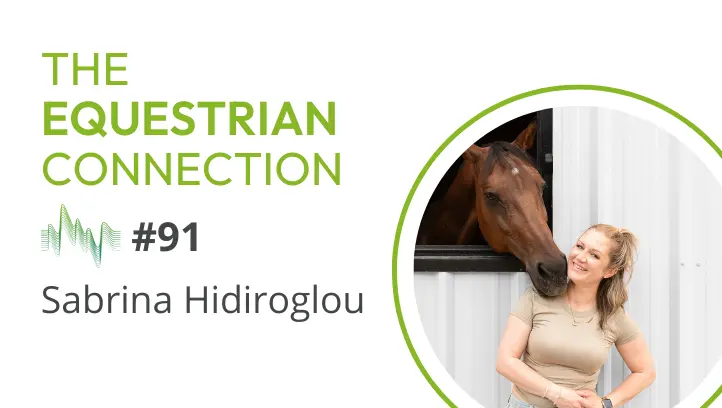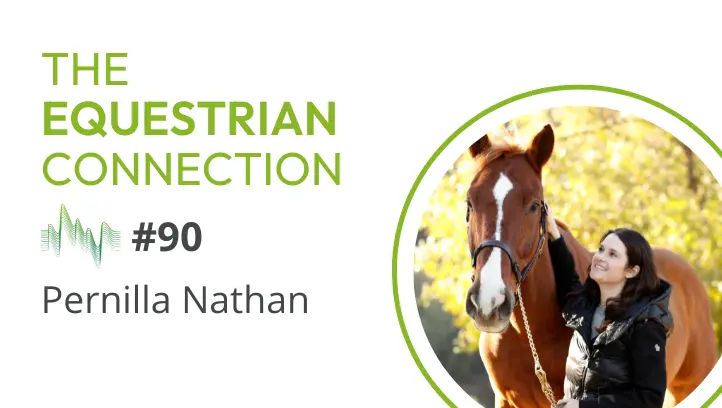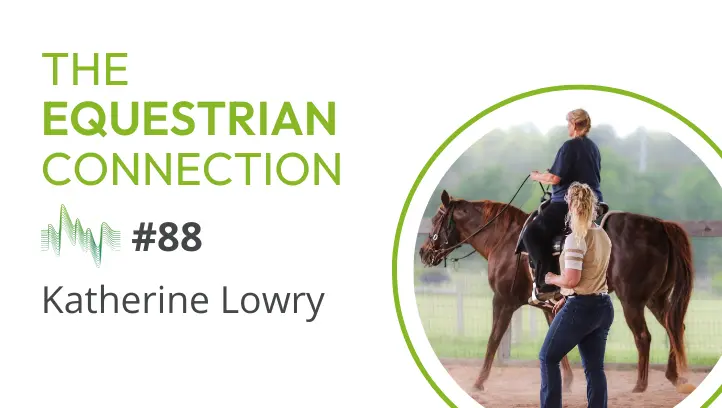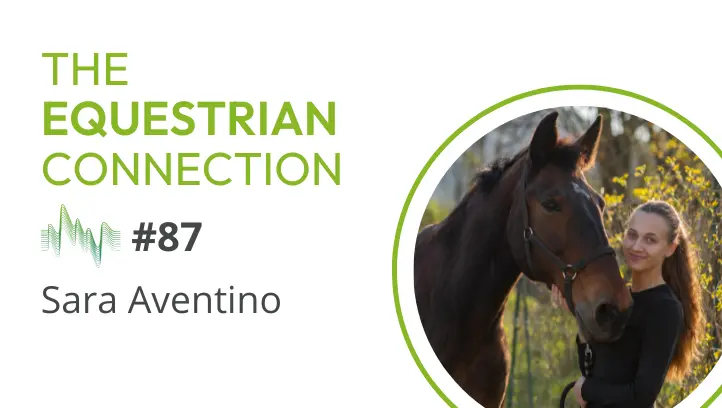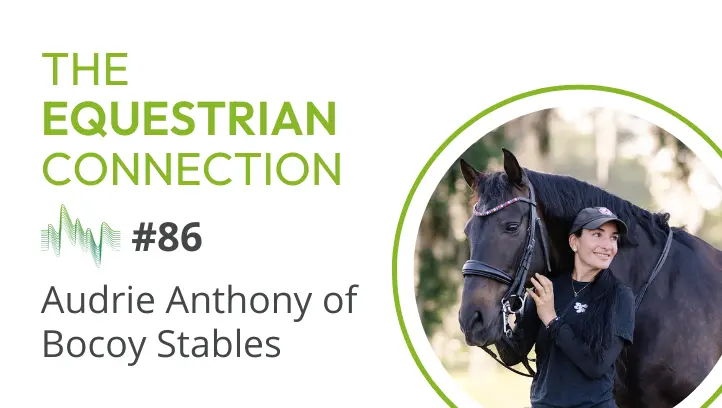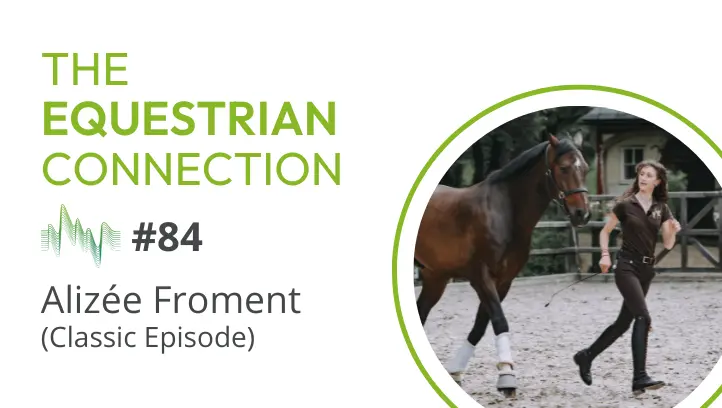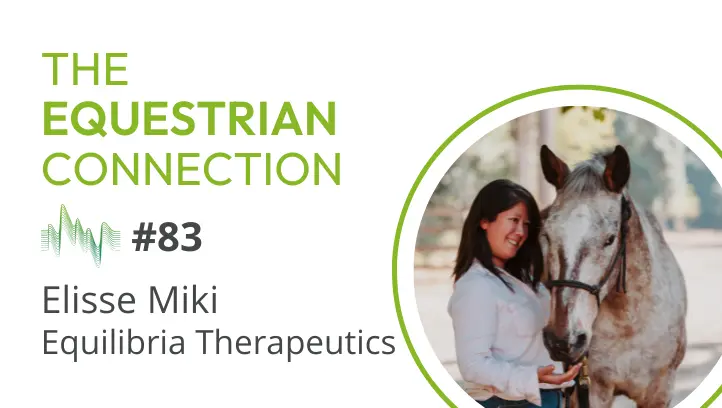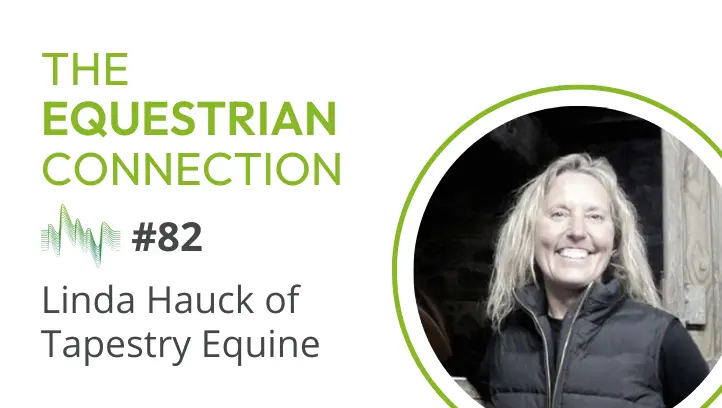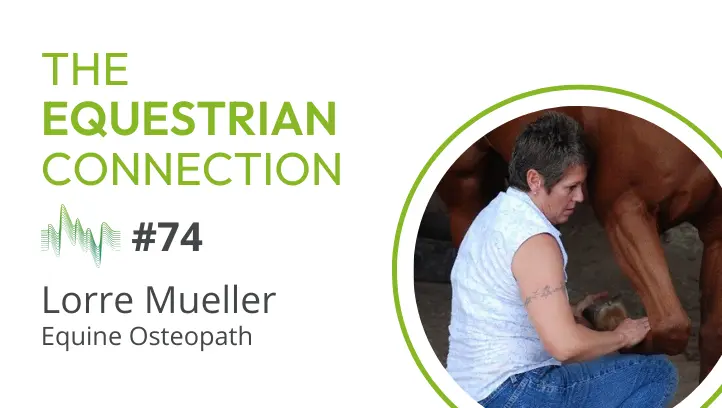#19 Making Waves in Online Equestrian Education with our CEO Christian Kroeber
Christian Kroeber is Co-Founder & CEO of wehorse, a brand of welearn GmbH. wehorse is Europe's leading streaming education provider for equestrians, and now has users in over 40 countries around the globe, including an expansion into North America.
Born in Germany, Christian has a distinguished background in both entrepreneurship and equestrian sports. Having successfully competed in Dressage and Show Jumping on a national level, he has been deeply rooted in the equestrian world from early on. For example, his father founded EQUITANA, the Equestrian Sport World Fair, in 1972.
Christian shares the passion to connect horse-lovers globally and push the frontiers of technology and education. He pioneered the concept of online equestrian education by transforming the former company “pferdia TV” from a DVD-based e-commerce site into wehorse, the equestrian education and video streaming platform we know and love.
Christian continues his involvement in the sport as a moderator and host of major equestrian events such as EQUITANA, World Cup Events, the German Championships in Dressage and Show Jumping, and many more.
Podcast Transcript
This transcript was created by an AI and has not been proofread.
This transcript was created by AI and has not been proofread
[SPEAKER 1]Welcome to the Equestrian Connection podcast from wehorse, the online riding academy. My name’s Danielle Kroll, and I’m your host. On this episode, we’re talking with Christian Kröber, the co-founder and CEO of wehorse. Yes, our very own wehorse. Born in Germany, Christian has a distinguished background in both entrepreneurship and equestrian sports. Having successfully competed in dressage and show jumping on a national level, he has been deeply rooted in the equestrian world from early on. For example, his father founded Equitana, the equestrian sport world fair in 1972. Christian shares the passion to connect horse lovers globally and pushes the frontier of technology and education. In 2018, he pioneered the concept of online equestrian education by transforming the former company Perferdia TV from a DVD-based e-commerce site into wehorse, Europe’s leading equestrian education and video streaming platform. Christian continues his involvement in the sport as a moderator and host of major equestrian events such as Equatana, World Cup events, the German Championships and Dresdagen show jumping and many more. I’m so excited to chat with him today and learn more about what inspired him to start wehorse, what inspires him to push for change in the equestrian industry and so much more. Let’s dive in. Christian, it’s interesting. I can’t say welcome to the podcast, you know, because you’ve, of course, started the podcast and been here before. So this is a really interesting one for me, though, where I get to turn the tables and interview you, the CEO of wehorse. So welcome.
[SPEAKER 2]Yeah, thank you, Danielle. It’s actually super exciting for me also to be on the other side of the table. And also to share some maybe interesting facts about the company, how it all came together. And I’m super excited to be here.
[SPEAKER 1]Good, good. Well, let’s dive right in. So we’re going to go back to the beginning. How did you get into horses? And what were your first few years like as an equestrian?
[SPEAKER 2]Yeah, how do I get into the equestrian sport? That’s a good question. I was born into one of these horse families and there was actually no escape for me. And my father founded a big equestrian fair and at home when I was very young, you know, when you are five or six or seven, you kind of have the first memories you make. And I remember very well that famous people from the horse world in Europe or in Germany, I’m living in Hamburg, Germany right now. And this is also where the majority of the operation of our company, as wehorse is today, is located. So I was basically born into this horse world, but I never wanted to ride. It’s an interesting fact. Until I was 11, 10 or 11, I can’t remember exactly, 10 or 11, I didn’t want to ride at all. I actually, I played football. So I was not interested in horses at all. Of course it was expected of me that I’m going to ride or be an equestrian, but it was never the case. I was not interested. And then when I was 10, One of my cousins, she has frequently come, she frequently came in the summer to our place basically to do vacation and to ride our horses. And I liked her a lot. I liked her a lot. And the only option to spend time with her was grooming the horses, being around the horses, riding and all these things. And I already had a pony waiting for me, but there were always other people riding the pony because I didn’t have any interest in her. And the pony’s name was Dolly. And yeah, then these were the first steps actually of me also picking up horse riding and then from there things evolved.
[SPEAKER 1]So you’re being very humble and modest saying that your dad started an equestrian fair. So for those who don’t know, Christian’s father started Equitana, which is now a worldwide event. And what was that like, to be in amongst the growth of now what is such a large event?
[SPEAKER 2]I think I have a different angle on that or a different view. The reason why like I’m not being humble on purpose here, it’s more that I don’t have or I didn’t contribute to what Equitana is right now. So I wasn’t a factor in that equation. Of course I’m very closely following what Equitana is today and also let’s say the past 15 years, the time that I can oversee. But of course it was a very important time also for me to see how Equitana got bigger. I basically grew up on this equestrian fair that brought people in from all over the world, from North America, from African countries, from Australia, New Zealand. So it was always fascinating to me. And of course, I have very deep relations to what Equitana represents as an idea and also as the commercial platform it is today. but nevertheless I didn’t contribute to the success of Equitana and that’s why I always tend to say that I’m today an ambassador of Equitana but I’m trying to do my own thing or we also as a team here try to do our own thing. Hopefully, it’s not only an attempt and also we get something done. So that’s why there was always this very humble notion of not being a part of it, but also seeing the benefits and how it got bigger. And yeah, how eventually also my equestrian world has been established and formed.
[SPEAKER 1]That makes a lot of sense. Now let’s go back to Dolly for a second. So once you became 10 or 11 and you did start riding, where did it go from there?
[SPEAKER 2]You know, in Germany, we have a very organized horse sport system. Let’s phrase it like that. And it changed in the past years. But back then, you basically had two options dressage or show jumping, or both, like I have two brothers and two sisters and my two sisters, they are both riding and one of them on an international level, she was riding eventing, so combining show jumping and dressage. I’m more leaned into dressage. I was actually, when I was a kid, I was pretty afraid of show jumping because I never had a horse that really was able to, you know, help me in difficult situations in a course. And so I was more turning towards dressage when I got a little older. But the interesting thing is, Because as a boy, it’s not very easy to not pick up another sport and stick to riding because you are mostly surrounded by girls. Um, and, um, I think it’s a phenomenon that is global and, and, and, and is getting stronger, uh, by the year. And we were five or six guys that were, we were in on the same school or in the same school and then riding together. And that was, that was actually helping me a lot because it’s a lifestyle around that, you know,
[SPEAKER 1]Do you wish you could have a better partnership with your horse but aren’t sure where to start? Do you want to advance your riding or horsemanship but don’t have access to the ideal resources in your area? Does the idea of learning about horse training whenever and wherever and at a price that won’t break your horse bank sound appealing to you? Check out WeHorse.com to access over 175 online courses with top trainers from around the world. We have courses on everything from dressage to groundwork to show jumping to bodywork and as a member you get access to everything in our WeHorse library to watch whenever you want. Oh and we also have an app which means you can download a course or video to watch without wi-fi which is perfect for those days at the pyramid when you want a quick dose of training inspiration before your ride. So what are you waiting for? Go to wehorse.com and check out our free seven day trial to access our WeHorse library and see if it’s a good fit for you. We can’t wait to see you in there. And now back to the episode.
[SPEAKER 2]After school, we went to the stables and did everything together. And that was super cool. And then later, I also got more ambitious. I was riding very competitively and eventually in dressage until the pre-St. George level. And I was also winning some medals at regional championships. So there was some success, but nevertheless, I think all my trainers had a hard time training me because I’m not blessed with too much talent, to be fair.
[SPEAKER 1]Well, it’s one of those things that, I mean, I agree, I’m in the same boat, I’m the same way, where I’m like, you know what, I’ll get to a certain level and then I’m aware that I peak, you know. Exactly.
[SPEAKER 2]And I peaked with 17.
[SPEAKER 1]I’m happy to just be a pleasure rider that does it for the fun of it. I know I’m not going to go anywhere else, that’s fine.
[SPEAKER 2]And I think my entire perspective on that changed also. Today, I’m just a pleasure rider. I wouldn’t have the ambition to go on hall shows and compete on a certain level because I know what effort it takes. to get me there. And the combination between horse and rider and you need a trainer, you need a facility. So there are so many factors, so many puzzle pieces that have to come together that today I’m just a pure pleasure rider and that brings me way more joy than being in the ring all day and writing for ribbons. It’s just a different thing or it’s the same thing just with a different perspective or a different take on it.
[SPEAKER 1]I’m sure everyone listening is, whether they agree with being a pleasure rider or they resonate with being a competitive rider, they probably are nodding their heads right now thinking, yeah, I like being a pleasure rider. Or they’re thinking, yeah, I’m aware of everything I have to sacrifice to the training, the facility, all of that stuff, the work-life balance to be a competitive rider. Totally. Totally.
[SPEAKER 2]And I think if I may add, it is so much fun being a competitive writer. Like none of you get me wrong that I don’t or didn’t like being a competitive writer. It is really, really cool and I have so many great memories of that. But as you grow older, then you realize eventually it boils down to the experience you have with a horse. And you can achieve that by being the best at a horse show and winning ribbons. But you can also achieve that by going out for a trail ride. So it is basically two sides of the same coin.
[SPEAKER 1]That ties in nicely to WeHorse, actually. The brand being there’s something on the platform for everybody, whether you are a competitive rider or whether you’re a pleasure rider or a horse lover. So what inspired you to start WeHorse? As you went through your equestrian journey, when did you start to think, I’d really like to bring and education to everyone that doesn’t have access to trainers and facilities and all the things we’ve mentioned.
[SPEAKER 2]So first of all, I’m a writer myself and I know the obstacles and challenges that each and everyone has in their daily routines. And so, as we have a little time, I can tell the longer version of the story. I never intended to have a professional life in horse sport. But I was always looking at the industry and checking different companies and I was always interested in how different companies can help people overcome problems or solve problems for them. In 2017, so we are almost in 2023, so almost six years ago, my back then, the parents of my back then girlfriend, now my parents-in-law, they were having a basically a publishing house for learning content DVDs in Germany. And they were actually looking for someone to take over the business because they were into the DVD world and they didn’t have the power and the energy to bring it to the digital world. And I was always looking at different companies and thinking, hey, if you digitalize this or that it could be a problem solver for thousands of people. And I actually, I would have never thought of asking them, hey, can I take this over? Because at that stage we were not that close yet. But then at some point they were asking me basically, hey, do you want to take this over? I was working in the financial industry and I wasn’t really satisfied. And that’s how I, together with my business partner Sophie, that was the point we took over this publishing house from my parents-in-law and turned it into a video based learning platform, because I knew back then for myself, I had one trainer, he didn’t have time every day, not in those times that were suiting me best, and also not for the price tag that I wished for and back then a platform like Wios would have helped me a lot to get inspiration, problem solvers, step-by-step tutorials and We turned this amazing library of content into a video streaming platform and learning platform and then we started producing new content with famous writers. We already had relations to all these writers and in the existing content there was already a lot and then we basically branched out into other different areas and in 2019 we started with our English language platform. first focused on European countries and then, I think it was last year, we broadened out or reached out across the pond to North America, which is super exciting for us. And that’s how basically the idea of WeHorse and the brand and I think what we represent and also what our mission is, yeah, came together.
[SPEAKER 1]And that’s something that I love, especially living in a rural area that I do. Having access to, whether it’s trainers at the top that you want to really learn from, or even just somebody to be able to come into your area or for you to trailer to theirs, it can be challenging. Also, I live in an area with four seasons, so if I could have eternal sunshine, it would be lovely and wonderful, but I don’t. I have winter and wet seasons and all that, so having my horses at home, I don’t have an indoor arena anymore. I can’t always be riding. And so having the courses that aren’t always ridden, like there’s so many ridden courses, but there’s also a lot that are on groundwork or the T-Touch and the Masterson method, like I’m loving those right now where we’re having so much rain. And so it’s wonderful and well-rounded. And the other thing that you focus on so much with WeHorse is horse-friendly training. which is a term that we’re hearing more and more and more and something that you’ve basically built the business on. So can you explain what horse friendly means to you and how WeHorse accomplishes that goal?
[SPEAKER 2]I think horse friendliness for us is paramount. It is the key to everything that we do. What do we mean by horse friendly? By horse friendly we mean that we want to propagate or bring across philosophies, training methods, training techniques that are in the interest of the horse. I think it’s a trend that we see globally, that horse welfare and also quote-unquote rider welfare is becoming more and more important to everyone. So that means that the selection of trainers that we have, the way we look at training techniques and methods and philosophies is super important to us. There are some training philosophies out there that we believe are super beneficial for your horse. And that’s why we have a huge number of trainers on the platform that also resonate with this notion of being horse friendly.
[SPEAKER 1]Yeah, I think it’s something that’s so important. Like I said, it’s such a topic that we’re seeing more and more of, and it’s a needed topic. And I think that we’re only going to see the conversation around horse-friendly and horse-first increase.
[SPEAKER 2]Totally. And I think it’s a development both in Europe and in North America. Of course, they are different in tone and style, but eventually, We have to do more pro-horse things in order also to convince the wider public that equestrian sport is something that should be Olympic, something that should be… should be done on a competitive level. I know for instance that the Olympic status of the equestrian sport is at the moment at the International Olympic Committee being questioned a lot. that is not something that is in the news every day. But the reason why it’s questioned so much is that the organizers of Olympic Games are afraid that equestrians will will bring so much media attention if things go wrong that it’s gonna be a risk for them having equestrians besides people that do fencing, rowing and football. And I think the entire discussion around horse friendliness has to happen against the backdrop of we want to keep horse sport as a sport also. And that feeds into the notion that we talked earlier about. Am I a pleasure rider or am I a competitive horse show rider? I think it doesn’t matter if you’re competitive or horse show rider, it has to be pro horse. because at some stage we will have a hard time arguing why we do horse sport at all. And here in Europe it’s a huge discussion, I know it’s different in North America, but nevertheless I think we as an industry have to face this discussion and also come up with arguments why horse sport is beautiful and there are a million arguments because it’s the only sport that involves two individuals which is rider and horse coming together in this beautiful manifestation of relationship eventually. But it can only happen if we stress the pro-horse aspect more profoundly.
[SPEAKER 1]I completely agree. Now, running a online company can have its challenges. And then we mix in the ever-changing equestrian landscape. So what challenges have you met while running an online equestrian education platform? And if you can think of any examples, what ways have you risen to the challenge? What do you still kind of see as a challenge?
[SPEAKER 2]So I think in the first years there was resentment. Is it legitimate to use an online resource to improve my skills? There was a huge discussion and I remember that we introduced at some point FAQ section on the bottom of our start page and the first item read What is online learning and what is online streaming? Because people just couldn’t think of, when they checked out wehorse.com, what our product is. It was just like, what is this? The Online Writing Academy? Am I supposed now to cancel my trainer and watch videos? What is that? And I think that was one of the major obstacles and I think COVID alleviated much of this pressure because people now and also in the older generation You know, without Zoom, things couldn’t happen. You were using Zoom to attend your uncle’s wedding. You were using Zoom to attend classes in university. It was the only chance to stay connected with the outside world and people then better understood how online resources can help them reaching their goals faster and I think that was a major driving force also for us. I know COVID hit many many businesses very hard and I say this with all the humbleness that is required because many people suffered a lot. For us COVID was an accelerator and helped us reaching more people. I remember very well when the virus broke out and one country after another closed down and it was March and April of 2000, two years ago. 2020? 2020.
[SPEAKER 1]Not 2000.
[SPEAKER 2]A little more than that. That was a little earlier. 22 years of COVID.
[SPEAKER 1]Don’t even put that out there.
[SPEAKER 2]No, no, no.
[SPEAKER 1]Two years.
[SPEAKER 2]Thankfully, it’s over now. Then, without us being like proactively approaching any media outlet, we were featured in the main horse journal of New Zealand. And starting one day we had people coming in from New Zealand. Then the other day it was Canada. Then it was the United States. And it was really cool seeing that eventually we helped people all over the world. To be precise we are now serving people in 56 countries and that is a huge inspiration to me that equestrians all over the world can unite around this notion of horse-friendly training and then we help them with our videos. be it Cavaletti training with Ingrid Klimke, or as you mentioned, T-Touches by Linda Tellington-Jones, or the Masters in Method from Jim. It is just so cool to see that, yes, there have been obstacles. You ask about what have been the major challenges. I think getting people to understand what the product is and how we can help has been one of the major. big challenges? Have there been many small challenges? Oh, yes. Oh, yes. From I remember our first production in Florida, it was during COVID. And we had no chance to go over to Florida ourselves because at that time I was in Europe and there was no chance to come across the pond on an airplane, because the United States says, no, no, no, you’re coming from a high-risk country, we don’t let you in. But we wanted to shoot or produce with Karen Rolfe the course that you see on WeHouse right now. And we put together a team without ever, ever, ever meeting them in person. We did this via Zoom. and everything we have done collaboratively via Zoom, the production schedule and everything was managed from Europe and then we had the producer in North America and Karen’s right hand in Florida and when it was really cool that even though such a challenge as Covid and travel restrictions have been in place, we were still able to get something cool out. you’ve been asking for challenges, that I think was a very concrete challenge that we faced here, of course, very frequent, not the travel restrictions, but every production is different. Every corporation is different. And we try to do a lot here. So there are many challenges, but mostly 51% of them, we can manage.
[SPEAKER 1]Mm-hmm. I think it’s just gone to show how much technology has truly opened the doors. Like you said, to be able to put together a team of never meeting them and organizing something to create something in this very collaborative effort, like that’s something that never would have happened without the use of technology and also without COVID kind of making us realize that we can do it. And the other is the compliment of the online learning. It’s not so much, okay, like you had mentioned, you have to stop what you’re doing, fire your trainers, all of that, and then just focus on online learning. In my area, we have a wonderful dressage trainer, but she’s in the next province over, and she only comes to our province once a month. And so you’d book in the lesson when she’s here, and you’d work with her once a month, and then a month later, she’d come back. And I was finding that so much of my once a month was being almost wasted, because you went such a long time without seeing one another, and you had to go back to, okay, what were you focusing on? And then adding in the online courses in between, it was kind of like, well, here’s what we’ve been learning, check this out. And then you add on to your lesson from there. So it’s been a wonderful complement to have the technology with the in-person training.
[SPEAKER 2]I always tend to say that we are the workbench. We are helping you to reach your goals faster, to get more inspiration for your training, concrete exercises, step-by-step tutorials, to basically support what you have already in place, be it the trainer from the other province or someone that is there more frequently. We have many, many trainers also, and that’s interesting, also using Wehorse and recommending concrete courses to the students saying, hey, I won’t be here for another two weeks, please check out this or that course. And then we can talk about it once I’m back.
[SPEAKER 1]That’s interesting. Yeah, here, watch this to learn your flying lead changes and then let’s focus on that. Yeah, that’s a neat idea.
[SPEAKER 2]And the interesting thing about it is that, you know, when I was learning all of this, let’s say flying changed. Flying change is something when you’ve never experienced what a flying change feels like it’s super hard to explain to you what you should do and how it should feel like because that’s a difference between equestrianism and let’s say tennis or soccer or golf, you know, there are very technical factors. you swing the racket, you hit the ball and it shall go 15 yards and that is what is expected from you. for riding there is so much more feeling and technique involved and it’s super hard sometimes to explain how it should feel like but feeling is so important and it is so cool to watch these trainers on our platform describing this because there are not many people out there that can describe this very well how to ride a flying change. I would have loved this, to have this in my active writing career, to have this resource at my hand that can underpin and undermine what I’m doing right now. I’m just supporting that.
[SPEAKER 1]Absolutely. So what would you say makes WeHorse different? There’s lots of different learning things that are on the market. And what do you think makes WeHorse stand out?
[SPEAKER 2]I think there are a couple of reasons why we believe WeHorse can help everybody. And one is we talked about our ProHorse philosophy a lot. Second is The courses that we create, they follow a curriculum, they are enriched with additional content. We are at the moment working on something completely new that will enrich the entire course experience and eventually it is also the trainers that we have. We have trainers from a kaleidoscope of disciplines and from different worlds. You have the classical European approach, you have also the North American approach, you have just the best from the best from all over the globe and I think this makes us unique because We are not looking at, okay, where is this or that person we believe is leading in this or that field, where is this person located and is that close to where we are or close to where we as people are. We more think of, okay, who’s the best in each respective field And the best is not always the Olympic winner. That is also interesting to know. There are Olympic winners, Olympic champions that are by far the best riders. But if you sit down, and I do this frequently, if you sit down with someone that is super successful and you ask, okay, why did you ride this turn? Why like this? How was, how were the aids? Some, and I’m really talking Olympic winners, say, I don’t know, because it’s my feeling. Being the best trainer for us and our goal is to work with the best, it is a combination of things. It is not only the most successful, not only the one with the highest social media reach and the most followers, but also can this person explain this in plain English that everybody can understand. And that is super important. So this aspect of being a good teacher, being a good trainer, being a good expert on things is super, super important. And we very closely vet everyone that we are working with against this backdrop.
[SPEAKER 1]I think that’s, like you had mentioned, so important to have a clear layout, especially when it’s online learning and you can’t always just ask the question. You need them to be very clear in their explanation from the beginning.
[SPEAKER 2]And sometimes people mix up success and the ability to train people. And I know very, very successful trainers that helped people reach the highest goals, medals, world championships and more, that have never been profoundly good riders. But of course they know what they are talking about. And they just have the talent to express and explain things in such a good way that people understand better. And that is what we are looking for.
[SPEAKER 1]Now, what do you predict for the future of equestrian education? What is exciting you for 2023 and beyond?
[SPEAKER 2]I think we are living in exciting times. Technology already helped us to help more people around the globe. only at the beginning. These days people are talking about metaverse and other things. I don’t believe that we will stop riding horses. And that is eventually the nucleus of also what we do here. We want to be a technology leader to help people, not to have technology in the forefront. And so what I’m hoping for, and I’ve been asked this exact question yesterday in an interview, What I’m hoping for the equestrian sport, be it in the US and Canada or beyond, that more people pick up riding in the year 2023 than the year 2022, so that we have more people engaging with horses, more people coming into not only the industry but into this world, into this horse world, That’s what I’m excited for. This is what we are working for here every day to inspire people. And if we can reach this goal, this would satisfy me and also the entire team. You are also part of this team, Danielle. We are working together on this every day. I think this will satisfy us all.
[SPEAKER 1]So you’re a very busy man, Christian. Apart from running WeHorse and WeDog and the entire Wheeler and company, you also moderate and host major equestrian events. I think it’s so cool when I watch different videos of the German championships and that, and I can hear, and I’m like, that’s Christian talking, I can hear your voice. as the announcer. What is it like moderating these major equestrian events, like going from that teenager that was competing to now being the one in the announcer booth?
[SPEAKER 2]It’s actually pretty cool. I always say it’s my semi-professional hobby. It is super cool to be involved in these world-class events and I’m very grateful for that, that actually when I was 19 I’ve given the opportunity to prove myself. Obviously I didn’t screw it up totally, so now today I am moderating and hosting a complete portfolio of events here in Germany. It is from the German championships for instance in dressage and show jumping to World Cup events. But also I’m moderating the evening shows at Equitana, which is for me personally, of course, a very emotional thing, because I’ve been growing up on this event and now I am the moderator and host in the big arena with the capacity of 4,500 people sold out every night and I’m the one in the middle of the ring. That is, of course, very emotional and special to me. And also, I think it’s a good mix also for Wehorse, because I see a lot. Moderating Equitana is kind of like a equestrian world showcase for nine straight days and I get all the latest trends and the latest trainers and what’s changing and the cool thing about the horse world is it’s changing every day and That is, for me, I’m very blessed that I have this semi-professional hobby. Sometimes my wife is not so happy when I’m gone for three days to a horse show somewhere in Europe, but it’s super cool to do.
[SPEAKER 1]I did the announcing for a local horse show this summer and I was channeling my inner Christian. Yes, yes. It was so nerve-wracking. I don’t know if I’ll do it again. It was very nerve-wracking.
[SPEAKER 2]Yeah, it’s only nerve-wracking for the first time. You get used to it. And you’re a very talented podcast host, so probably, probably you will have not a hard time extending that to the announcer game.
[SPEAKER 1]Oh, thank you. So you have a one-year-old, or almost one.
[SPEAKER 2]Horse or human?
[SPEAKER 1]Child. And now, do you see ponies in your future?
[SPEAKER 2]Of course. Of course. We are still negotiating this here at the dinner table. How are we going to do this best? Nevertheless, of course, you know, I was born into a horse family. It’s still a horse family. I run a horse business. So I think there’s no way around it. But I think what’s important is if you have kids and you are coming from the horse world, if you look at entry list these days, you see a lot. This is the son off and this is the daughter off. I think it’s always good to give freedom of choice. If Henry decides to, hey, I don’t like horses that much, let’s play tennis or football. Okay, so be it. But of course, horses will play a role.
[SPEAKER 1]Ponies are just so fun. Well, sometimes. So let’s jump into our viewers’ questions and you obviously know them, Christian.
[SPEAKER 2]For all of you that don’t know, we are also having a podcast in Germany and those questions, Danielle, as you said, they are coming also from our German podcast.
[SPEAKER 1]Yes, I may have stolen them from the German podcast. You may have. So obviously, we’re going to jump right into the first one. There’s no no guessing or shocking you with this. Do you have a motto or a favorite saying?
[SPEAKER 2]Yes, it is Panta Ray. Pantarei basically means everything flows. It’s by a Greek philosopher. I think it’s Heraclitus. I’m not super sure. But Pantarei is something that I identify with a lot. Everything flows, I believe. the world is always in motion, nothing is set in stone, things are always changing, and this is a motto that I believe in.
[SPEAKER 1]I like that. Who has been the most influential person in your equestrian journey?
[SPEAKER 2]That’s actually hard to say. Of course, people would first probably say my father, though I must say my father died when I was 11, so over 20 years ago. But still I think the impact on my life that Equitana had and growing up in this environment still shaped me a lot, so I would say my father. Though he is sadly not around, it is still a big influence. And I sometimes find myself asking, what would he have done in my place when I’m faced with difficult decisions?
[SPEAKER 1]If you could give equestrians one piece of advice, what would it be?
[SPEAKER 2]To love your horse and to always focus on a good relationship and seeing your horse as a real partner.
[SPEAKER 1]Please complete this sentence.
[SPEAKER 2]For me, horses are… For me, horses are the passion that has so far shaped my life.
[SPEAKER 1]Is there anything else you’d like to add for our listeners?
[SPEAKER 2]No, I would like to thank you to be on the other side of the podcast. And I think, Daniel, we can already give a little sneak peek that our listeners here in this podcast will hear me soon with a special episode for Christmas.
[SPEAKER 1]Yes, yes. And if you want to go, if anybody hasn’t gone back and listened to some of our earlier episodes, go all the way back and you’ll hear Christian as the podcast host. And then, yeah, there’s going to be another episode coming up here shortly that’s really exciting. And we’ll just leave the little details there as sprinkled in hints that Christian will be the host of.
[SPEAKER 2]It’s gonna be, we can leave one hint, it’s gonna be produced in Europe, close to Copenhagen, Denmark.
[SPEAKER 1]So we’ll see if anybody wants to do any… Research. Figuring that out, yeah. So where can people find you and how can they connect with you? And of course I’ll be putting all the WeHorse links and stuff in the show notes.
[SPEAKER 2]Of course, Instagram, my handle is Christian Krober, K-R-O-E-B-E-R. And of course, get in touch with us if you want to on social media with WeHorse, our team. And if you have any questions that you want me to have answered, you can also drop me an email christian at wehorse.com.
[SPEAKER 1]Perfect. Well, thank you so much, Christian, for jumping on the podcast here with me today. I really appreciate it. And I hope that you enjoyed it as much as I did.
[SPEAKER 2]I enjoyed it a lot. Thank you, Danielle. And yeah, see you soon.
[SPEAKER 1]Thank you for listening to this episode of the Equestrian Connection podcast by wehorse. If you enjoyed this episode, it would mean the world to us if you could leave us a rating and review, as well as share us on social media. You can find us on Instagram at wehorse_usa, and check out our free seven-day trial on wehorse.com, where you can access over 175 courses with top trainers from around the world in a variety of topics and disciplines. Until next time, be kind to yourself, your horses, and others.

